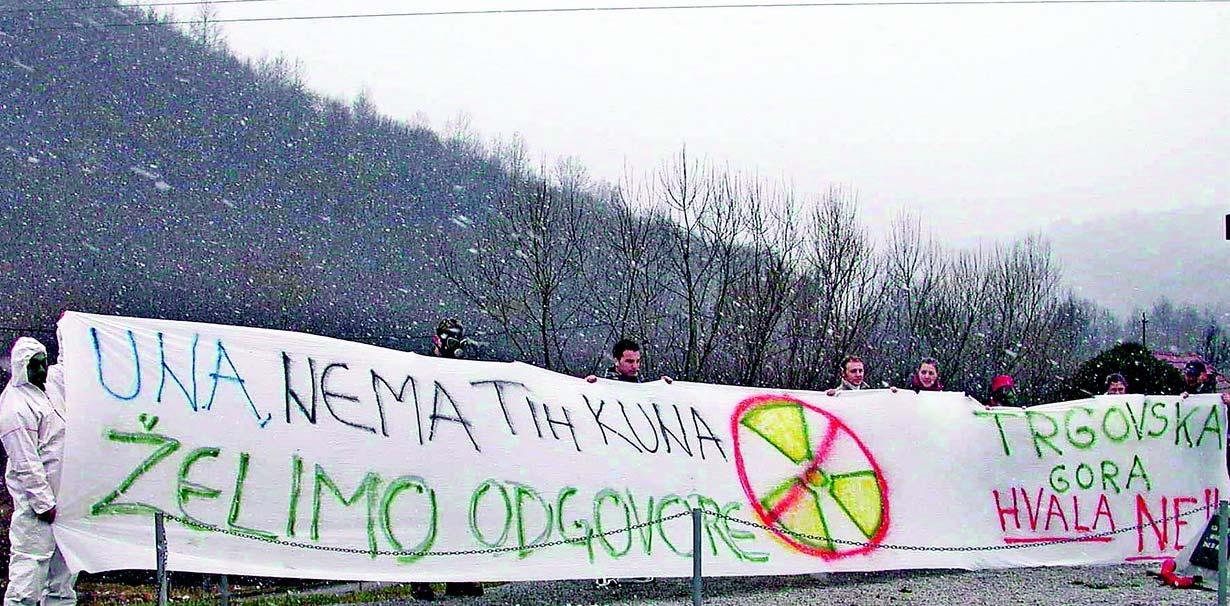 Local communities in Bosnia - and in Croatia - are uniting in opposition to a Croatian government plan to construct a radioactive waste disposal site in a pristine natural environment.
Local communities in Bosnia - and in Croatia - are uniting in opposition to a Croatian government plan to construct a radioactive waste disposal site in a pristine natural environment.
A long-ignored local environmental issue is threatening to become a major political headache for Bosnia’s leaders, as well as a point of dispute with neighbouring Croatia.
Six municipalities in northwest Bosnia have demanded state protection against a Croatian government plan to build a radioactive waste disposal site near the Bosnian border.
In a joint letter to Bosnia’s Premier, Denis Zvizdic, the municipalities called on the Bosnian state to intervene on their behalf and threatened to undertake legal actions against Bosnia’s institutions if they fail to act.
“If the authorities ignore the citizens and the local authorities’ requests, we will use all legal means to protect citizens’ lives and health as well as the environment," the letter reads.
Zvizdic on Monday told Bosnia’s Ministry of Foreign Trade and Economic Relations to discuss this matter with Croatian counterparts and prepare information on the issue for the next session of Bosnia’s state government, the Council of Ministers, Bosnian media reported.
Croatia’s plan to build a radioactive disposal site on Trgovska gora, only a few miles from the border with Bosnia and Herzegovina, has at least briefly united six municipalities from Bosnia’s two normally quarrelling entities.
Four municipalities from the mainly Bosniak and Croat Federation entity – Bosanska Krupa, Buzim, Cazin and Velika Kladusa – and two from the predominantly Serbian entity, Republika Srpska – Novi Grad and Kostajnica – are all located close to the planned radioactive disposal site and are equally concerned about the consequences if Croatia carries out its plan.
Croatia first mooted construction of a radioactive disposal site in 1999 and back then it triggered strong negative reactions. Croatian civil society groups collected more than 16,000 signatures in a petition against the project.
After Croatia joined the EU in July 2013, the issue was reopened. In line with EU norms, Croatia is obliged to adopt a national program for radioactive waste disposal by the end of this year, construct a site and move all of its radioactive material – mostly coming from the nuclear power plant at Krsko – there by the end of 2018.
After Croatian media in April reported that Trgovska gora is one of four possible locations for the site, nearby municipalities in Bosnia and Croatia initiated moved to block the scenario.
Additional concerns relate to the fact that they have been relying on the natural beauty of the region, located in the basin of the river Una, to develop tourism and organic agriculture.
“We want to build our future in organic agriculture and tourism. How can we explain it to people and how can we attract visitors if we have nuclear waste here?” the governor of the Croatian county of Sisak Moslavina, Ivo Zinic, asked on Croatian media recently.
In recent weeks, the Croatian authorities have tried to allay the concerns of local communities in Croatia.
Addressing the local assembly in the Croatian municipality Dvor na Uni on April 22nd, Sasa Medakovic, head of Croatia's State Office for Radiological and Nuclear Safety, said the construction of such a site would have no environmental impact.
Medakovic also said the waste disposal site would bring benefits to local communities in the form of additional EU funds and direct investment worth tens of millions of euro.
He said Bosnia had a right to seek additional measures to ensure protection of its own environment, but stressed that Croatia had the right to decide this issue by itself.
But, local officials and citizens in Bosnia appear united in their determination to block the plan.
Speaking on the main RTRS TV station on Monday, Srebrenka Golic, Republika Srpska Minister of Spatial Planning, Civil Engineering and Ecology, said the rights of local communities in Bosnia enjoy protection under the UN Economic Commission for Europe, UNECE, convention, signed in 1991 in Espoo, Finland. This obliges countries to consult their neighbours before constructing such waste disposal sites.
Golic said the mechanism of last resort is international arbitration, but she hoped it would not have to come to that.
“The constitution of Bosnia and Herzegovina says the state has to provide a healthy life for its citizens on its territory. If the state fails to do so, I am afraid we will sue our own state,” the mayor of Novi Grad municipality, Snjezana Rajilic, told Balkan Insight on Monday.